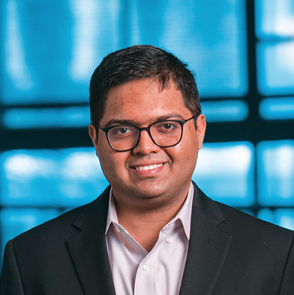
- This event has passed.
MSE Seminar: “Turbo-charging Silicon: Do we have the materials and devices?” (Deep Jariwala) University of Pennsylvania
November 16, 2023 at 10:30 AM - 12:00 PM
Silicon has been the dominant material for electronic computing for decades and very likely will stay dominant for the foreseeable future. However, it is well-known that Moore’s law that propelled Silicon into this dominant position is long dead. Therefore, a fervent search for (i) new semiconductors that could directly replace silicon or (ii) new architectures with novel materials/devices added onto silicon or (iii) new physics/state-variables or a combination of above has been the subject of much of the electronic materials and devices research of the past 2 decades. The above problem is further complicated by the changing paradigm of computing from arithmetic centric to data centric in the age of billions of internet-connected devices and artificial intelligence. Therefore, there is a pressing need for complementing and supplementing Silicon to operate with greater efficiency, speed and handle greater amounts of data. This is further necessary since a completely novel and paradigm changing computing platform (e.g. all optical computing or quantum computing) remains out of reach for now.
The above is however not possible without fundamental innovation in new electronic materials and devices. Therefore, in this talk, I will try to make the case of how novel layered two-dimensional (2D) chalcogenide materials and three-dimensional (3D) nitride materials might present interesting avenues to overcome some of the limitations being faced by Silicon hardware. I will start by presenting our ongoing and recent work on integration of 2D chalcogenide semiconductors with silicon 1, 2 to realize low-power tunnelling field effect transistors. In particular I will focus on In-Se based 2D semiconductors 1 for this application and extend discussion on them to phase-pure, epitaxial thin-film growth over wafer scales, 3 at temperatures low-enough to be compatible with back end of line (BEOL) processing in Silicon fabs.
I will then switch gears to discuss memory devices from 2D materials when integrated with emerging wurtzite structure ferroelectric nitride materials 4 namely aluminium scandium nitride (AlScN). First, I will present on Ferroelectric Field Effect Transistors (FE-FETs) made from 2D materials when integrated with AlScN and make the case for 2D semiconductors in this application. 5, 6 Next I will introduce our work on Ferroelectric Diode (FeD) devices also based on thin AlScN. 7 In addition, I will also present how FeDs provide a unique advantage in compute-in-memory (CIM) architectures for efficient storage, search as well as hardware implementation of neural networks. Finally, I will present ongoing work and opportunities to extend the application of AlScN memory devices into extreme environments.
I will end the talk with a broad perspective on the role of novel materials that could turbo- charge silicon and other pervasive semiconductor technologies for electronic computing.
References:
1. Miao, J.; et al. Jariwala, D., Nature Electronics 2022, 5 (11), 744-751.
2. Miao, J.; et al. Jariwala, D., Nano Letters 2020, 20 (4), 2907-2915.
3. Song, S.; et al. Stach, E. A.; Olsson, R. H.; Jariwala, D., Matter 2023
(online).
4. Kim, K.-H.; Karpov, I.; Olsson, R. H.; Jariwala, D., Nature Nanotechnology
2023, 18 (5), 422-441.
5. Liu, X.; et al. Stach, E. A.; Olsson, R. H.; Jariwala, D., Nano Letters 2021, 21
(9), 3753-3761.
6. Kim, K.-H.; Stach, E. A.; Olsson, R. H.; Jariwala, D., Nature Nanotechnology
2023.
7. Liu, X.; et al. Stach, E. A.; Olsson III, R.; Jariwala, D., Applied Physics Letters
2021, 118 (20), 202901.
8. Liu, X.; et al. Stach, E. A.; Olsson, R. H.; Jariwala, D., Nano Letters 2022, 22
(18), 7690–7698.

Deep Jariwala
Associate Professor, Peter & Susanne Armstrong Distinguished Scholar in the Department of Electrical and Systems Engineering at the University of Pennsylvania
Deep Jariwala is an Associate Professor and the Peter & Susanne Armstrong Distinguished Scholar in the Department of Electrical and Systems Engineering at the University of Pennsylvania (Penn). Deep completed his undergraduate degree in Metallurgical Engineering from the Indian Institute of Technology in Varanasi and his Ph.D. in Materials Science and Engineering at Northwestern University. Deep was a Resnick Prize Postdoctoral Fellow at Caltech before joining Penn to start his own research group. His research interests broadly lie at the intersection of new materials, surface science and solid- state devices for computing, opto-electronics and energy harvesting applications in addition to the development of correlated and functional imaging techniques. Deep’s research has been widely recognized with several awards from professional societies, funding bodies, industries as well as private foundations the most notable ones being the IEEE Photonics Society Young Investigator Award, IEEE Nanotechnology Council Young Investigator Award, IUPAP Early Career Scientist Prize in Semiconductors, the Alfred P. Sloan Fellowship, the AVS Peter Mark Memorial Award and also the Bell Labs Prize (shared with Troy Olsson and Eric Stach). He has published over 130 journal papers with more than 17000 citations and holds several patents.
Website: jariwala.seas.upenn.edu
